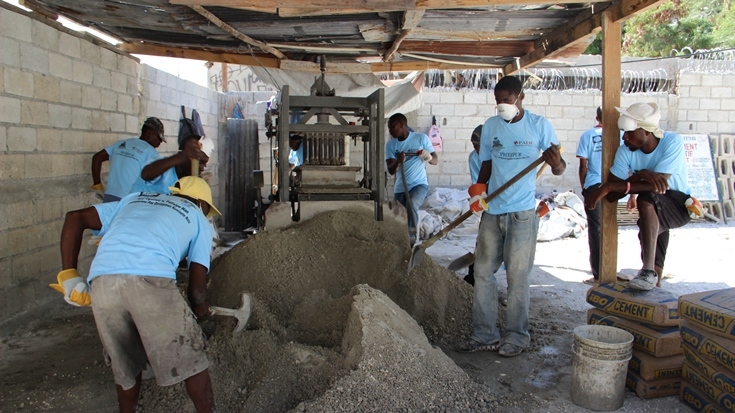Even before entering FENAD, the small brick-making factory, the noise is deafening. In the middle of the yard, Chevelin Nicolas, the manager, oversees operations and sometimes lends a hand sorting sand, mixing, loading the machine, completing the production of cement blocks, and stacking them so that they are well protected from the sun—all critical steps in making blocks suitable for construction.
“We chose to build this factory because the area (Delmas 32) was completely destroyed after the earthquake and we decided that the people must be able to rebuild using high-quality materials,” says Nicolas, adding “these blocks have passed the tests administered by the Ministry of Public Works.”
“This Project Has Allowed Us to Expand”
With 40 workers from the community, 50 indirect workers, 1,500 bricks sold daily, and up to 150,000 gourdes (approximately US$3,200) in monthly profit, these numbers truly represent a success story for a company that started out with ten workers and sold at most 150 bricks daily.
When Force d’Entraide Nationale pour le Développement (FENAD) decided to start the business in 2010, it did not have financial and technical resources. Identified in the context of an Urban Community-Driven Development Project (PRODEPUR) in 2012, FENAD put up more than ten percent of the equity capital and received US$20,000 in funding. Thanks to technical and administrative training, workers and senior staff improved both the product and the management of the company.
Today, in addition to being self-sustaining, FENAD has also bought its own land. “We worked hard; we paid one million gourdes (roughly US$21,000), using the profit we made,” says Nicolas proudly.
“Providing as Many Services as Possible to Our Community”
On Jean-Georges street in Delmas 32, residents chat in front of a house under construction. Salesperson Wisner Mettelus points out that “this house and many others were built with blocks from the factory.” It is not uncommon to see people from the community coming to pick up bricks in wheelbarrows or carrying them on their heads.
This factory is the only one that sells blocks of this quality in this area of 46,000 residents. In the past, members of the community had to travel far to get these products. Now they have a nearby full-service facility—FENAD makes sure it provides training so that they have the basic skills to supervise the work done by the foremen who build their homes.
FENAD is only one of the 400 completed subprojects funded by PRODEPUR.
PRODEPUR has helped improve the living conditions of more than 270,000 persons by supporting existing community initiatives to expand access to water, electricity, and sanitation services; it has also helped improved neighborhoods by constructing public spaces and rehabilitating roads and corridors, thus connecting residents to health centers, schools, and other services in nearby communities.
One of the biggest benefit: the associations participating in this project are firmly committed to the well-being of the residents of their neighborhoods. Chevelin Nicolas promises that “we will do our best to manage this project well, to provide as many services as possible to our community, and to develop our area.”
Link:
This project is co-financed by the World Bank and the Caribbean Development Bank for a total amount of USD 53 million. Is it implemented by Haiti Office of Monetization of Development Aid Programs (BMPAD) with NGOs PADF, CECI, and JPHRO .

